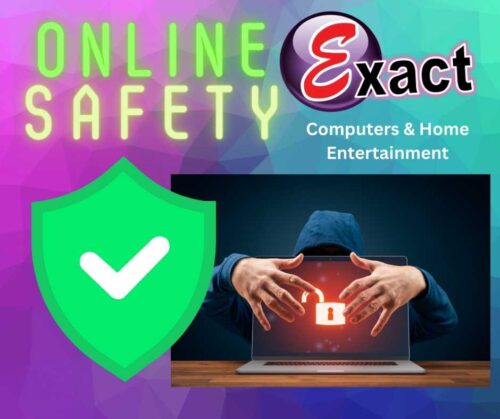Keeping yourself safe Online.
As we have moved more online, so have the people who want to steal from us. At least 3 or 4 jobs come into my shop each week, where we have to check over the computer, make sure no Malware or malicious software is left behind, and talk to the customer to find out how and what the scammers did, so we can make sure the computer is clean and safe to use.
So here are a few simple tips to follow to make it harder for the scammers
1 – Use Strong, Unique Passwords: Create strong passwords and avoid using the same password across multiple accounts. Consider using a password manager to keep track of them.
2 – Enable Two-Factor Authentication (2FA): Add an extra layer of security by enabling 2FA wherever possible. This usually involves receiving a code on your phone or email in addition to entering your password.
3 – Keep Software Updated: Regularly update your operating system, antivirus software, and other applications. Software updates often include security patches.
4 – Beware of Phishing: Be cautious of emails, messages, or links that seem suspicious. Avoid clicking on unknown links or providing personal information unless you are certain of the source. If you’re not sure DON’T.
5 – Use Secure Websites: Look for “https://” in the URL, especially when entering sensitive information. This indicates a secure connection. Note – Not always, so double check…
6 – Be Mindful of social media: Adjust your privacy settings on social media platforms, and be cautious about sharing personal information. Be selective about accepting friend/follow requests.
7 – Educate Yourself: Stay informed about common online threats and scams. Knowing what to look out for can help you avoid falling victim to them. – a great reference guide… https://www.accc.gov.au/about-us/publications/the-little-black-book-of-scams
8 – Monitor Your Accounts: Regularly review your bank and credit card statements. Report any suspicious activity to your financial institution immediately.
9 – Backup Your Data: Regularly back up important files and documents. This can help protect you in case of data loss or ransomware attacks. VERY Important, and make sure at least one backup is OFF-LINE.
10 – Teach Online Safety to Others: If you have children or elderly family members, educate them about online safety. Help them understand the potential risks and how to protect themselves.
The internet is full of useful information and can be a great way to keep in touch with loved one. But just like the real world it can be dangerous.
REMEMBER
If you’re not sure DON’T…


